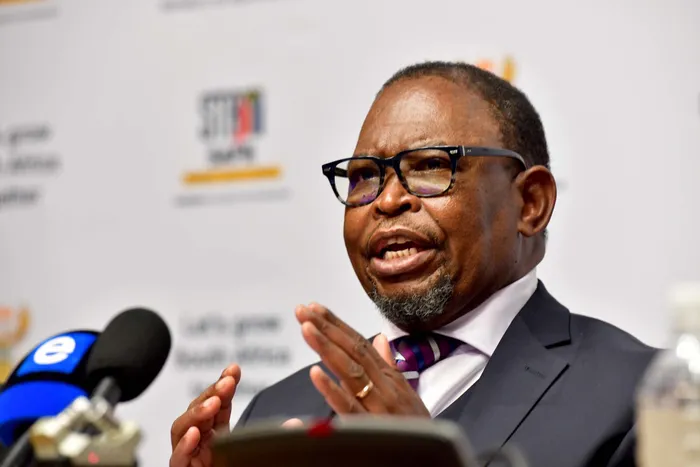What VAT hike U-turn means for businesses

Finance Minister Enoch Godongwana.
Image: Elmond Jiyane/GCIS
ALL businesses who have loaded an increased VAT on customer invoices need to reverse it before May 1 following Finance Minister Enoch Godongwana’s about turn on the 0.5% hike on Thursday.
The decision to forgo the increase follows extensive consultations with political parties, and careful consideration of the recommendations of the parliamentary committees, said the National Treasury.
By not increasing VAT, Treasury added, would see an estimated revenue shortfall of around R75 billion over the medium-term.
Godongwana said Parliament will be requested to adjust expenditure in a manner that ensures that the loss of revenue does not harm South Africa’s fiscal sustainability.
The move comes amid fractured GNU relations over the issue. The DA had not voted with its coalition partner when the Fiscal Framework was tabled in Parliament after the ANC refused to concede to its demands, which included the privatisation of certain ports among others.
The DA then decided to approach the courts when the ANC secured enough support from within and outside the GNU to have the budget containing a VAT increase, passed.
The sudden turn of events came as the Western Cape High Court was expected to deliver its outcome next week having heard arguments from the DA and the EFF on why Godongwana did not have powers to hike the VAT. Their application also challenged the process followed to have the Fiscal Framework adopted.
In a clear sign of the broken relations in the GNU, the ANC along with the parties that supported the Budget except the DA and Freedom Front Plus held a media briefing where it contended that the decision not to proceed with the VAT hike followed extensive deliberations with both GNU partners and parties outside the GNU and not actions by the DA.
The parties included were the Patriotic Alliance, Inkatha Freedom Party (IFP), United Democratic Movement (UDM), and the Good Party. Parties outside the GNU were the National Coloured Congress (NCC), Build One South Africa (BOSA) and ActionSA.
“It must be stated without ambiguity: the Democratic Alliance (DA) did not win in Cabinet, in Parliament, or in the courts. What they seek to brand as a “victory” is in fact the result of consultations and consensus-building,” said ANC spokesperson, Mahlengi Bhengu-Motsiri.
She accused the DA of seeking to entrench the legacy of exclusion, not dismantle it.
“The DA's typical opportunistic attempt to claim victory is a continuation of their typical insult to South Africans whom they consider voting cattle with no sense of thinking or reasoning. It further demonstrates their incapacity to understand principles of collaboration, persuasion and engagement on which our successful democracy is built, but continue to fashion themselves as 'the baas in the room' who must be solely unjustly glorified for any and all of South Africa’s successes since 1994,” she said.
In a statement, DA's Federal Council Chairperson Helen Zille the intention to withdraw the planned VAT hike was a major victory for the party and, more importantly, for millions of South Africans.
“From the outset, the DA has opposed this tax increase, highlighting its impact on already struggling South African households. Our urgent court application filed in the Western Cape High Court exposed not only the unconstitutional and procedurally flawed nature of the VAT hike, but also the arbitrary power the Minister of Finance sought to wield in imposing it…ironically, the Minister’s backtracking underscores the very point made in our court application: that he had attempted to exercise unconstitutional powers to impose or withdraw VAT unilaterally.”
Zille confirmed that her party was awaiting a formal written settlement offer before responding to Godongwana’s request.
“Our legal action achieved its intended result. When Parliament failed to act, the DA stood firm to protect the public from the consequences of a tone-deaf and anti-poor budget.”
Weighing in on what Godongwan’s decision meant, University of Johannesburg Professor in the College of Business and Economics, Daniel Meyer said: "Government must publish that now and all companies who have loaded an increase need to reverse it before 1 May, it should be possible. No major issue. It's good news, we don’t need more tax, we need less tax. Personal income tax (PIT) will in any case still rise due to bracket creeping. VAT increase would have led to increased prices and more inflation which is bad for the economy. Consumers are already struggling and cannot afford it. The government must cut expenses, not increase expenses.”
Investec economist, Lara Hodes said: “Now that a decision has been made, it provides a level of certainty and will likely buoy consumer confidence which slumped in the first quarter of the year.”
Andrew Donaldson, a senior research associate at Southern Africa Labour and Development Research Unit (SALDRU) at UCT said that the government would now have to revise its spending plan.
“We don’t know what changes they’ll make to the spending plan. I do think that for many years there’s not been enough targeted attention to the kind of spending pressures that have built up. The Treasury needs to exercise tighter controls over extra budgetary funds," he said.
Cape Times